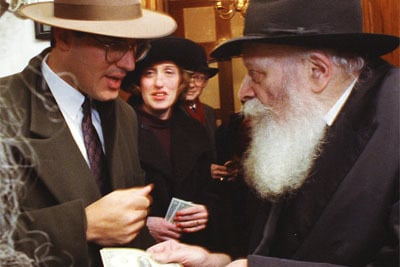For the first twenty-five years of his leadership, the Rebbe would receive his Chassidim, as well as men and women from all walks of life, in yechidut ("private audience") three times a week.
The audiences, held on Sunday, Tuesday and Thursday evenings, would begin shortly after nightfall and extend through the night; some nights, the last of the several hundred visitors would depart well after daybreak. Many had only a few short minutes in the presence of the Rebbe, but all would come away with the feeling that in their time with him, however brief, the Rebbe was with them with his entire being, wholly and exclusively focused on their individual concerns.
"When two people meet, something good should result for a third." The Rebbe, quoting his father-in-law, Rabbi Yosef Yitzchak of LubavitchThe number of those seeking the Rebbe's advice and blessing continued to grow; soon, all but the most urgent cases had to wait several months for a yechidut appointment. Finally, the requests for meetings with the Rebbe reached such numbers that it was no longer possible to accommodate them. Individual contact with the Rebbe now took the form of written correspondence: some three mail sacks of letters would arrive each day to his office at 770 Eastern Parkway in the Crown Heights section of Brooklyn, each of which he would personally open and read.
In 1986, the Rebbe began conducting a weekly "receiving line." Each Sunday, the Rebbe would stand in a small room near his office as thousands of men, women and children filed past to see him and receive his blessing. Many used the opportunity to pose a question and receive a word of advice. To each of them the Rebbe gave a dollar bill, appointing them as his personal agent (shaliach) to give it to the charity of their choice.
Why the dollar? The Rebbe explained his custom by quoting his father-in-law, Rabbi Yosef Yitzchak of Lubavitch, who would often say: "When two people meet, something good should result for a third." The Rebbe wished to elevate each of the thousands of encounters of the day to something more than a meeting of two individuals; he wanted that each should involve the performance of a "mitzvah" (good deed), particularly a mitzvah that also benefits another individual.
Again, a most amazing phenomenon was reported by all who came for "Sunday Dollars." The Rebbe, well into his ninth decade at the time, would stand for as long as eight hours without interruption. Yet in the few seconds that he or she was with the Rebbe, each visitor felt that the Rebbe was there only for them. It was as though he or she were the only visitor of the day.
Once, an elderly woman could not contain herself and burst out: "Rebbe, how do you do it? How is it that you do not tire?"
The Rebbe smiled and replied: "Every soul is a diamond. Can one grow tired of counting diamonds?"







Start a Discussion